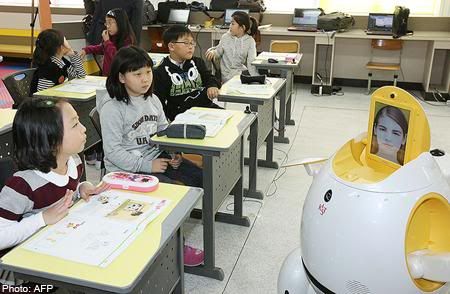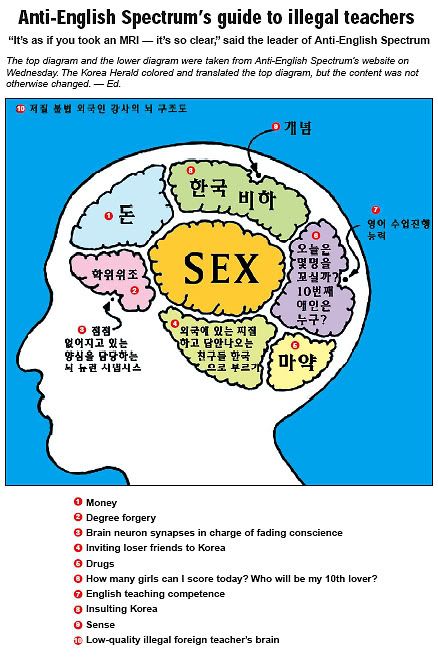Then the realization began to dawn, I am an immigrant, and all of the stigmas and stereotypes, benefits, drawbacks and blatant racism that comes with being assigned this line at customs, suddenly belonged to me. Now that a year and a half has passed since the dawning of my identity at the customs counter, I have found myself frequently examining my role as an immigrant. Is everything I am doing now reflecting not only on myself, but foreigners as a whole, or more specifically, foreign teachers in Korea? Should I be taking offense to the mass numbers of people who come here thinking of it as nothing but a year long vacation, and never acknowledging the fact that Korean families are paying a lot of money for their kids to be educated by foreign teachers?
I will rewind a moment and make the honest statement that in my year and 2 months in South Korea I have felt incredibly welcomed. Almost all of the people I have met here are very hospitable, and any different treatment I have received because I am a foreigner has mostly been embarrassingly in my favor. That being said, the demographic of Korean people who are less than thrilled about the invasion of the foreign English teacher on their homogeneous nation is small, but not insignificant.
When Korean school owners hire foreign teachers, the only contact they have with said teacher before their arrival in Korea is often a simple phone call and a photo. And while many of the foreign teachers here are very qualified for their jobs and their bosses are happy they made the hiring choice they did, it isn't uncommon to come across someone who is, how do I put this nicely... a massive weirdo. The incidence of the weirdo population amongst us immigrants has led to the invention of our technological replacement. I have to imagine that grocery store clerks feel about self checkout lanes the way I feel about this little gadget, designed specifically to replace the foreign weirdo in the Korean classroom. Blog readers (mom)... allow me to introduce you to the aptly named, English Teaching Robot.

According to an article on i09.com, $45 million will be spent by the South Korean government to bring the English Teaching Robot to 500 preschools and Kindergartens by 2011, and 8,000 schools by 2013. The plan is in motion, if the robot is as successful as tests have indicated it will be, to bring the robot to Elementary schools by 2015. And in all fairness, with how technologically advanced this country is, this robot is maybe not a terrible idea. Honestly, it probably does a much better job than some of my previous coworkers...
The robot is a peaceful solution to the discrimination against the foreign teacher, but some people have taken it a step further. Check out this article from the LA Times entitled "Korean Activists Target Foreign Teachers." (http://articles.latimes.com/2010/jan/31/world/la-fg-korea-english31-2010jan31) The article shines a light on a middle-aged Korean man named Yie Eun-woong, who spends his free time heading an anti foreign teacher organization which specializes in researching (pronounced stalking) foreign teachers with hopes of catching them in an 'immoral act' which they can then report to schools, parents of students, and, when appropriate, Korean authorities. The article says, "Then he follows them, often for weeks at a time, staking out their apartments, taking notes on their contacts and habits." Fun!
A simple Naver (Korea's Google) search of 'Anti English Teacher' brought me to this image, depicting the different sections of an English Teacher's Brain.

Again, in all fairness, this is a not entirely an unfair stereotype when looking at a small percentage of English teachers in Korea. But, on a larger scale, is this stereotype not applicable to a decent sized demographic in any population? And, to go back to my original question, are all immigrants expected to conduct a personal lifestyle under the assumption that every action will reflect the morals of their parent nation and or immigrant status as a whole?
An article in The Global Post attributes a big uprising of anti-English teacher sentiments to a Halloween party at a club in Seoul in 2008, where several foreign teachers were photographed with scantily clad Korean women. Though these women were dressed in Halloween costumes (which, if you have seen Mean Girls, you understand is synonymous with scantily clad) and were at the party based on their own choosing, the publication of these photos, in the eyes of many Korean traditionalists, reflected negatively on the English teaching population. These photos, mixed with a few highly publicized drug arrests of English teachers, inspired the formation of the activist group "Citizens of Right Education." The group, which currently has over 17,000 members, has a mission of eliminating foreign teachers from South Korea.
Though those who support the presence of foreign teachers in Korea far outnumber those who oppose it, the activists' statements have not been entirely ignored by the government. The activist inspired fear that the spread of HIV was due to the new influx of foreigners has resulted in the mandatory HIV testing of all Visa holders upon entering the country.
This blog post has gone in a different direction than originally intended, and I will leave the examples of anti-immigrant feelings in Korea here. I again feel that I strongly need to emphasize that I do not feel unwelcome in Korea. For every 1 person who dislikes the presence of foreign teachers, there are 100 smiling students and parents thanking us for moving across the world to help educate Korean children.
I guess the biggest thing I have learned from my immigrant status, beside the understanding that my actions do not only reflect myself, but my demographic as a whole, is that we all have to have a bit of understanding for immigrants in own countries. When I returned home last December, I felt aggressively defensive when I heard comments along the lines of, "and my gardener doesn't speak a damn word of English, you are in our country, learn our language." Moving to a new country is a huge life step, one that comes with many challenges you wouldn't expect. Your gardener, waiter, taxi driver, English teacher... they are all working a full time job, and are trying to support themselves and maybe an entire family with probably not a very high paying job. (And not everyone is as lucky as I am to be an immigrant in a country with such great health care...)Learning a language is hard, and you have no right to assume that they are not doing, to the best of their abilities, what they can to learn the native language. The most important thing to remember is that we are all people, and with that human title, you will find a lot of really great individuals, and some massive weirdos in the mix, but you should not judge someone based on their immigrant stamp in a passport.
Much love to you all, unless of course you are Yie Eun-woong...
Peter Teacher